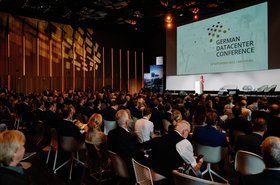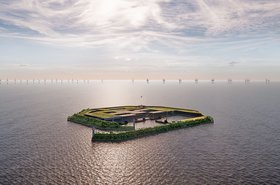The German data center industry is not pleased with German politicians. The industry is in the midst of a big expansion, and wants to get on with doing its own thing - and the German government has had the cheek to create a new law that impacts the freedom the industry has had till now.
The industry is pushing back big time. The Bundestag passed the “Energieeffizienzgesetz,” (Efficiency Act) this week, but the final law makes very different demands on data centers than those it first proposed. And the industry has sworn to keep fighting.
I’m just back from the front lines of this war of attrition.
Everyone was very polite at the German Data Center Conference, organized in Frankfurt by the German Datacenter Association.
Politicians were on stage, explaining why they wanted to legislate, and detailing the parallel efforts of the European and German governments to decarbonize society and make all industries efficient.
The German Energy Efficiency Act is, in part, an implementation of the European Energy Efficiency Directive, also published this week, although it goes further. While the EED is so far about gathering energy usage data, the Act requires efficiency measures to be implemented by the operators.
The industry was also vocal in explaining its position, and pointing out how important data centers are. Four German mayors were put on stage to explain the benefits they saw if data centers were built in their neighborhoods. And market watchers described the international competition for data center capacity.
Frankfurt was an interesting location for this. It's the second largest hub in Europe after the UK. In the next year or so it will pass 1GW of capacity, while London has 1.2GW.
Could Frankfurt catch up? So far, London hasn’t suffered any noticeable slowdown due to Brexit, but German developers say they are ready if Britain falters. And Germany, they point out, is ready to evolve into the next step - a two-hub nation, with a healthy data center community in Berlin as well.
So the sector really didn’t like it when the politicians proposed their Energy Efficiency Bill - which the GDA described last year as a "Data Center Prevention Act."
Under the first draft, all new data centers would have to meet PUE targets, and give 30 percent of their waste heat to district heating systems.
That would drive the sector’s business abroad, the Association said. There are very few district heating systems, and data centers cannot be located by them, because they have to be at connection hubs,
And the PUE figure tightened from 1.3 to 1.2 - something that colocation players said they can’t achieve because it would constrain their customers.
These objections were reasonable enough, but proponents of the act pointed out that the energy crisis in Germany is real, and that requirements for heat reuse are actually quite flexible.
DCD also understands that an earlier draft of the bill attempted to introduce heat reuse without requiring an unrealistically swift implementation - simply by instructing data center operators to put a realistic price and contract on the heat they could offer.
All that seemed a bit too intrusive for the German data center operators, who would like to continue to grow their business at will, without having to share any intimate details. They would also like any environmental developments, such as heat reuse, to come at their instigation - not under the direction of anyone else.
Time to open up
This attitude is not really a practical one now that data centers are an appreciable part of the country's industry and its energy use. Other industries face scrutiny, and I think German data centers know that they will ultimately be no different.
"We have to open our compounds up," said one operator from the stage.
And the GDA is actually doing this in an interesting way. On September 29, data centers in the country are holding an "Open Datacenter Day," in which colocation facilities will open their doors to the public, to explain what happens inside.
This kind of thing is only a sign of things to come. Data centers are a significant sized sector, and will need to respond to the resultant scrutiny.
The GDA may resent having to explain itself to the government, but it did some good organizing and ensured that there were friendly contacts from the government side on the event's stage - and drew a record-breaking audience from the industry, ready to quiz them.
It’s no longer possible for data centers to avoid the attention of governments. It is surely best to make this a public debate, which raises the profile of the industry and educates the public.
I really do think that other countries would benefit from the kind of public technopolitical bust-up that Germany is currently enjoying.




